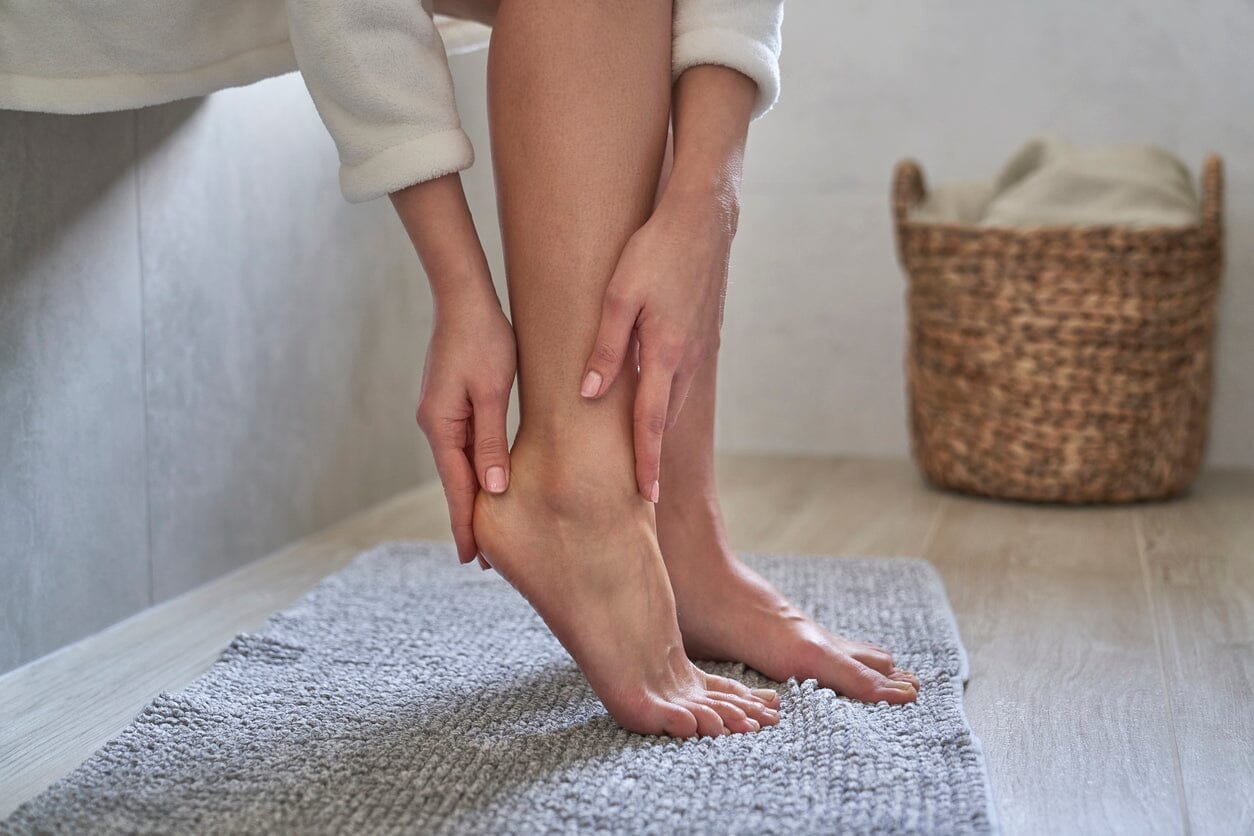
What’s causing your burning feet during menopause, and what could help?
Exploring the links between menopause, hormone changes, vitamin deficiencies and hot or burning feet, plus the treatments that could improve your symptoms.
Sometimes known as burning feet syndrome, burning, tingling or excessively hot feet can be an uncomfortable and sometimes painful menopause symptom that’s often worse at night.
While burning feet is not among the most common signs of menopause, plenty of women suffer from it. Symptoms can come and go but when they do flare up they can be hugely debilitating.
Burning feet syndrome can stem from a number of different causes, but during perimenopause and after menopause changes in oestrogen levels are often involved.
Low or fluctuating oestrogen may affect your nervous system, contributing to conditions called peripheral neuropathy and paraesthesia, as well as vitamin B12 deficiency.
Treatments for menopause burning feet include tips for keeping your feet cool and comfortable, vitamin supplements, capsaicin cream and, in some cases, prescription medications that treat nerve pain. Hormone replacement therapy may help some women but could make symptoms worse for others.
Read on to find out more about the causes and treatments for burning and hot feet during menopause.
The Better Gut probiotic supplements can help with a wide range of perimenopause and menopause symptoms, such as hot flushes, night sweats and poor sleep. They can also improve the health of your gut microbiome, including the group of microbes that process oestrogen.
To find out more, visit The Better Gut. And get 15% off your first order with the discount code START15.
How menopause and changing hormone levels can contribute to burning feet
As with many symptoms of menopause, levels of the reproductive hormone oestrogen are likely to be an important factor in some cases of burning or hot feet.
However, the relationship between oestrogen and burning feet may be complex.
Some women report that hormone replacement therapy (HRT), which replenishes hormones like oestrogen, gets rid of their symptoms. But for others, using oestrogen gels actually makes their burning feet worse.
And while certain causes of burning feet are associated with low oestrogen, others may be linked to fluctuating rather than reduced hormone levels.
Peripheral neuropathy
Peripheral neuropathy is pain in your extremities, like your hands and feet, due to nerve damage. It can cause burning and tingling sensations, as well as numbness, shooting pains and muscle weakness in your feet.
Diabetes is the most common cause of peripheral neuropathy but women who have been through menopause are also at increased risk and there’s evidence that reduced oestrogen levels play a part in this.
Studies involving postmenopausal women have found that those with peripheral neuropathy have lower oestrogen levels than those without neuropathy.
Vitamin B12 deficiency
Another cause of peripheral neuropathy is vitamin B12 deficiency.
B vitamins play an important role in the healthy functioning of your nervous system but during menopause you may need more vitamin B12. At the same time, your body becomes less efficient at absorbing B12 from food.
That’s why experts recommend that menopausal women take vitamin B12 supplements.
Paraesthesia
Paraesthesia is a burning, tingling or prickling sensation on your skin that can be a symptom of perimenopause – the lead up to menopause when your hormone levels are in a state of flux.
Paraesthesia can affect different areas of your body but is most common on your face, hands and feet.
It’s not clear exactly how paraesthesia is linked to perimenopause but some pre-menopausal women experience it in the days before their periods – another time when hormones are fluctuating and oestrogen levels are low.
Because oestrogen is involved in how your nervous system sends signals around your body, it could be that changing levels disrupt these signals, causing pain and unusual sensations.
Why are my feet hotter at night?
As your body gets ready for sleep, it undergoes a process called distal vasodilation. This increases blood flow to your extremities, lowering your core temperature and making your feet and hands hotter.
Distal vasodilation is a normal part of going to sleep but if your blood vessels or nerves are not completely healthy, it could make your feet unpleasantly hot or cause burning sensations.
This may help to explain why some women find their symptoms are worse at night.
Other causes of burning feet syndrome
Hot or burning feet can be a symptom of other health conditions, including:
- diabetes
- kidney failure
- an underactive thyroid gland (hypothyroidism)
- compressed nerves, such as in tarsal tunnel syndrome or other injuries
- erythromelalgia, a rare condition where symptoms often occur after exercise
- alcoholism
- certain medications
If you have other symptoms of these conditions and have not been diagnosed, you should talk to your doctor.
Don’t stop taking a medicine you’ve been prescribed without consulting your doctor.
How to treat menopause burning feet
The best treatment for hot or burning feet during menopause will depend on what’s at the root of your symptoms.
Some of the treatments below may provide temporary relief while others will aim to treat the cause.
Some you can try for yourself, some will require a diagnosis or prescription from a doctor.
Cooling your feet
Experts suggest wearing open, comfortable shoes, preferably with arch supports, and wearing cotton rather than synthetic socks to keep your feet cooler and more comfortable.
When your symptoms are particularly troublesome, soaking your feet in cool – but not ice-cold – water for around 15 minutes can provide some relief.
If you get hot or burning feet at night, you probably already sleep with your feet outside your bed clothes, but having an electric fan blowing on them can cool them down even more.
Vitamin B supplements
As we’ve seen, vitamin B12 deficiency is quite common in menopausal women and is one of the causes of peripheral neuropathy. Your body may also be less efficient at absorbing other B vitamins that could contribute to burning feet, so a B12 or B complex supplement could help.
If you’re diagnosed with peripheral neuropathy, your doctor will do tests to see if you have a deficiency and will advise on how to take any supplements. This may initially include vitamin B12 injections.
HRT
We’ve already seen that hormone replacement therapy may help some women with burning feet, but make symptoms worse for others. However, this is based on anecdotal evidence rather than scientific studies.
Your doctor can give you advice on HRT and what is the best kind for you to take. It may be a case of trying it to see whether it helps.
Capsaicin cream
Capsaicin is the chemical compound that makes chilli peppers taste hot. While it might seem counterintuitive, rubbing a small amount of capsaicin skin cream on the affected areas of your feet several times a day could help reduce burning sensations by desensitising the nerves that send pain signals to your brain.
Medications for nerve pain
Standard pain killers like paracetamol and ibuprofen don’t help with nerve pain. If you’re diagnosed with peripheral neuropathy, your doctor may prescribe one of a number of medications for the pain that are also used to treat other symptoms.
These include:
- amitriptyline, also used to treat headaches and depression
- duloxetine, also used to treat bladder problems and depression
- pregabalin or gabapentin, also used to treat epilepsy, anxiety and headaches
Summary
Burning or excessively hot feet are less common but troublesome symptoms of perimenopause and menopause.
Changing levels of oestrogen may be involved by contributing to peripheral neuropathy, paraesthesia or vitamin B12 deficiency.
The sleep process distal vasodilation, which increases blood flow to your feet, may partly explain why some women’s hot feet are worse at night.
Burning feet can be a symptom of a number of health conditions. If you have other symptoms, or are worried about what’s causing your burning feet, you should talk to your doctor.
Choosing the right footwear, soaking your feet in cool water or using a fan at night can help if you have hot feet. Taking vitamin B12 supplements or using capsaicin cream on your feet may reduce the symptoms of burning feet.
If you’re diagnosed with peripheral neuropathy, your doctor may prescribe specific medication.
For help with a range of perimenopause and menopause symptoms, including hot flushes, night sweats and sleep problems, try The Better Gut probiotic supplements.
For 15% of your first order, visit The Better Gut and use the discount code START15.
Discover our powerful formulations
-
Regular priceFrom £59.00Regular priceSale priceFrom £59.00 Save £-59.00 (%)Unit price/ per
Better Gut
in your cart -
Regular priceFrom £104.00Regular priceSale priceFrom £104.00 Save £-104.00 (%)Unit price/ per
Body Bundle
in your cart






